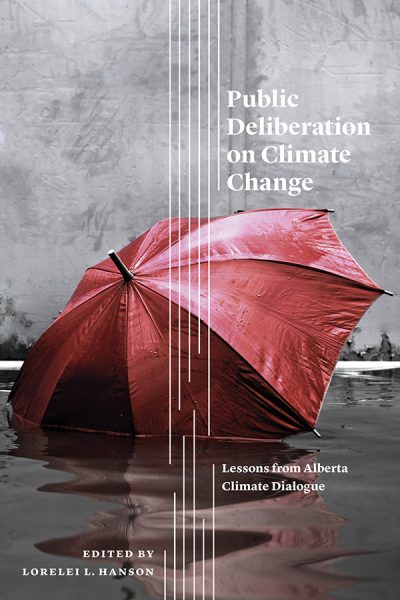Transparent Lives Surveillance in Canada
The New Transparency Project, edited by Colin J. Bennett, Kevin D. Haggerty, David Lyon, and Valerie Steeves

Subjects: Environmental Studies, Political Science, Public Policy, Sociology
Imprint: AU Press
There exists in both academic and political circles a growing interest in public deliberation as an alternative to the sometimes adversarial and polarizing public engagement activities that result in the pitting of experts against lay people. Proponents of public deliberation claim that a more deliberative process can engage a diversity of participants in a more guided process that better balances expert knowledge and citizen inclusion. Such an approach holds particular promise where citizens and governments engage in discussions of the most complex and intractable issues like climate change.
Given the host of challenges climate governance presents and the global consequences of our response to them, the experience and knowledge shared by Hanson and the contributors to Public Deliberation on Climate Change provide an important framework for advancing public conversations and processes on this and other wicked problems. The lessons contained in the volume were gained as a result of a five year multidisciplinary, community, university research project called Alberta Climate Dialogue (ABCD), which drew together scholars, practitioners, citizens, civil society members, and government officials from across Alberta at four public deliberations. By highlighting the value tensions and trade-offs and examining the impact that the design of the deliberations has on policy and the creation of conditions that encourage exchange, the contributors aim to build capacity within our institutions and society to find new ways to discuss and solve complex problems.
Among the sea of troubles facing the world, none are surely greater than that of climate change. But coming to grips with climate change – and possible mitigation strategies – is inextricably linked to other huge challenges, notably the concentration of power in fewer and fewer hands and the commensurate decline of the democratic commons. This volume provides a much-needed roadmap for citizens who wish to deliberately and constructively engage with these seemingly obdurate problems.
Trevor Harrison, Director of Parkland Institute
As governments at all levels struggle with how to address the impacts of climate change while at the same time seeking to build popular support for policies addressing its causes, Public Deliberation on Climate Change provides valuable lessons on how governments can and should be engaging the public in new and more meaningful ways. The experiences of the Alberta Climate Dialogue initiative provide an important framework for constructive public deliberations and an honest on-the-ground assessment of the pitfalls and successes of the various methodologies undertaken. It is a must-read for anyone interested in public policy, public engagement, and democratic deliberation.
Ricardo Acuña, Executive Director, Parkland Institute
This work is licensed under a Creative Commons License (CC BY-NC-ND 4.0). It may be reproduced for non-commercial purposes, provided that the original author is credited.